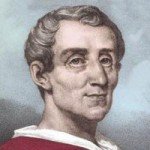 Charles-Louis de Secondat, better known as Baron Montesquieu (1689-1755) was a lawyer, aristocrat and one of the leading figures of the French Enlightenment. Montesquieu was born into a noble family in south-western France, where his family was significantly involved in provincial government. The young Montesquieu trained as a lawyer and spent time in Paris, becoming a visible member of the city’s intellectual set. In 1715 Montesquieu became president of the Bordeaux parlement, an office he effectively inherited from his father. In 1726 he sold his position in the parlement to travel and write. His travels included an extended period in England, where Montesquieu was a keen student of the British political system. Montesquieu’s early writings reveal him as liberal, a deist and a supporter of constitutional monarchy. Montesquieu was no radical democrat: he believed that law and government were best left to educated elites. In 1748 Montesquieu published his most famous work, De l’Esprit des Lois (“The Spirit of the Laws”), a comparison of different political systems. In this work, Montesquieu developed and refined the idea of the separation of powers, previously explored by English writer John Locke. He argued that government is most effective when divided into three discrete branches: executive, legislative and judicial. Each should have constitutionally separated powers that prevent one branch from gaining dominance over the other two, thus preventing any prospect of tyranny. The Spirit of the Laws was widely read across Europe and became arguably the most important work of political theory of the 18th century. It had a profound impact both on the American Revolution and on French revolutionary ideas. Montesquieu became blind shortly after its publication and spent his last years in seclusion, dying in 1755.
Charles-Louis de Secondat, better known as Baron Montesquieu (1689-1755) was a lawyer, aristocrat and one of the leading figures of the French Enlightenment. Montesquieu was born into a noble family in south-western France, where his family was significantly involved in provincial government. The young Montesquieu trained as a lawyer and spent time in Paris, becoming a visible member of the city’s intellectual set. In 1715 Montesquieu became president of the Bordeaux parlement, an office he effectively inherited from his father. In 1726 he sold his position in the parlement to travel and write. His travels included an extended period in England, where Montesquieu was a keen student of the British political system. Montesquieu’s early writings reveal him as liberal, a deist and a supporter of constitutional monarchy. Montesquieu was no radical democrat: he believed that law and government were best left to educated elites. In 1748 Montesquieu published his most famous work, De l’Esprit des Lois (“The Spirit of the Laws”), a comparison of different political systems. In this work, Montesquieu developed and refined the idea of the separation of powers, previously explored by English writer John Locke. He argued that government is most effective when divided into three discrete branches: executive, legislative and judicial. Each should have constitutionally separated powers that prevent one branch from gaining dominance over the other two, thus preventing any prospect of tyranny. The Spirit of the Laws was widely read across Europe and became arguably the most important work of political theory of the 18th century. It had a profound impact both on the American Revolution and on French revolutionary ideas. Montesquieu became blind shortly after its publication and spent his last years in seclusion, dying in 1755.
Information and resources on this page are © Alpha History 2018. Content on this page may not be copied, republished or redistributed without the express permission of Alpha History. For more information please refer to our Terms of Use.
